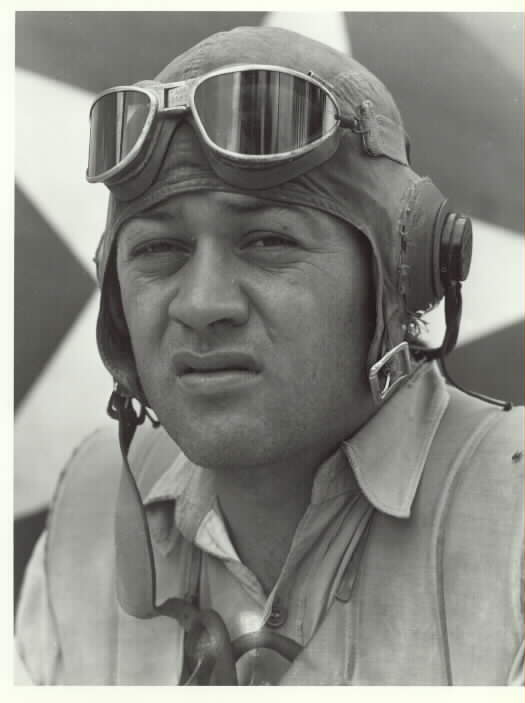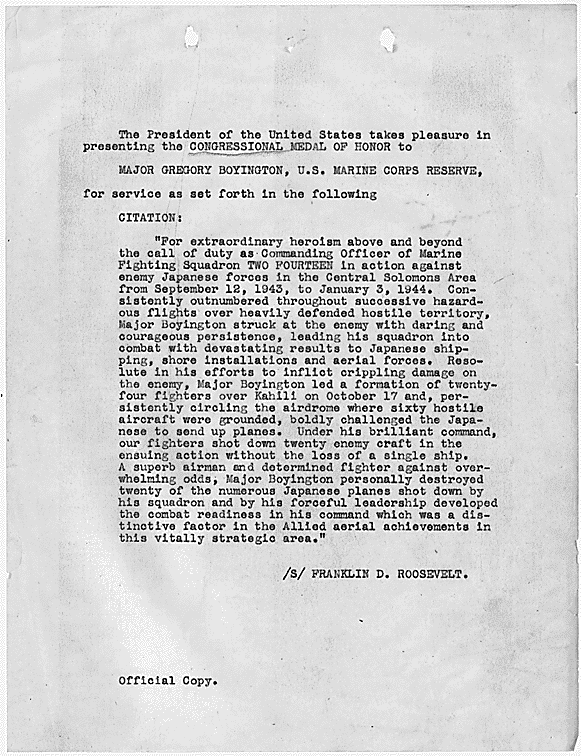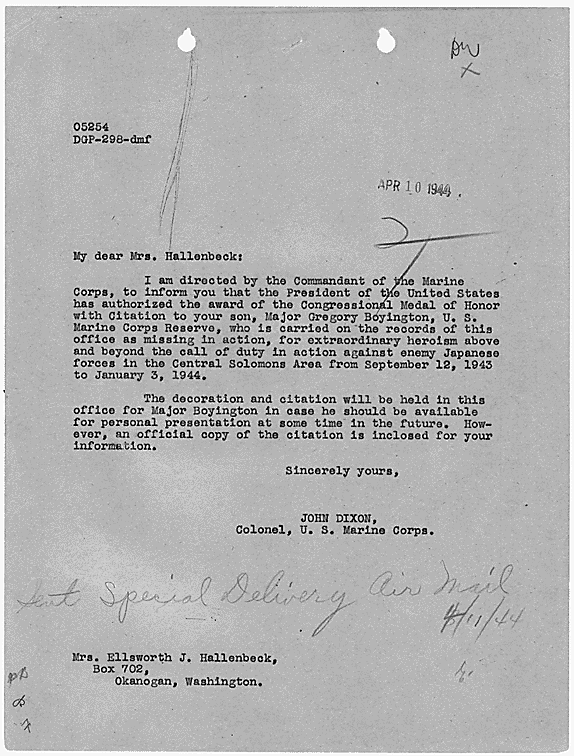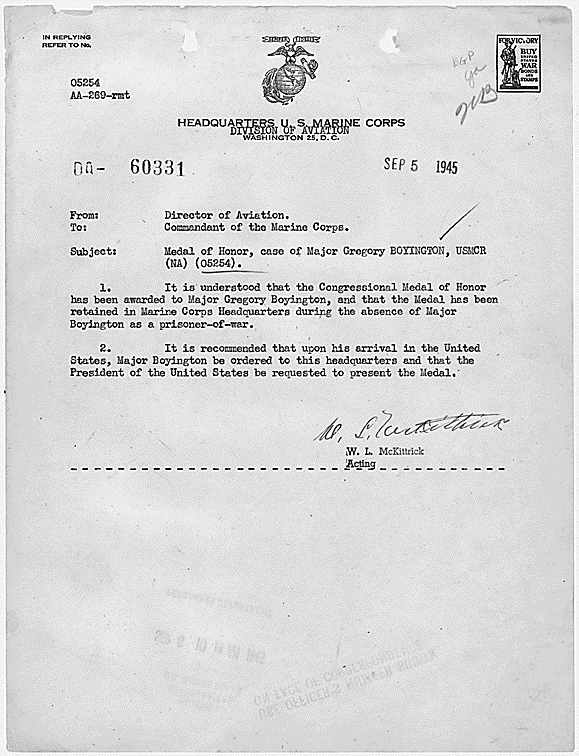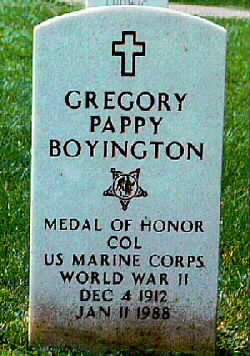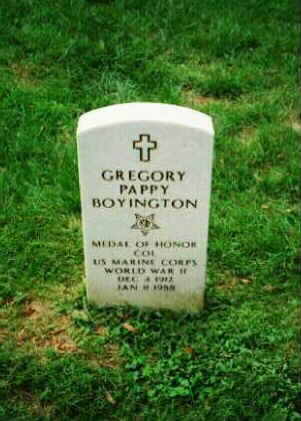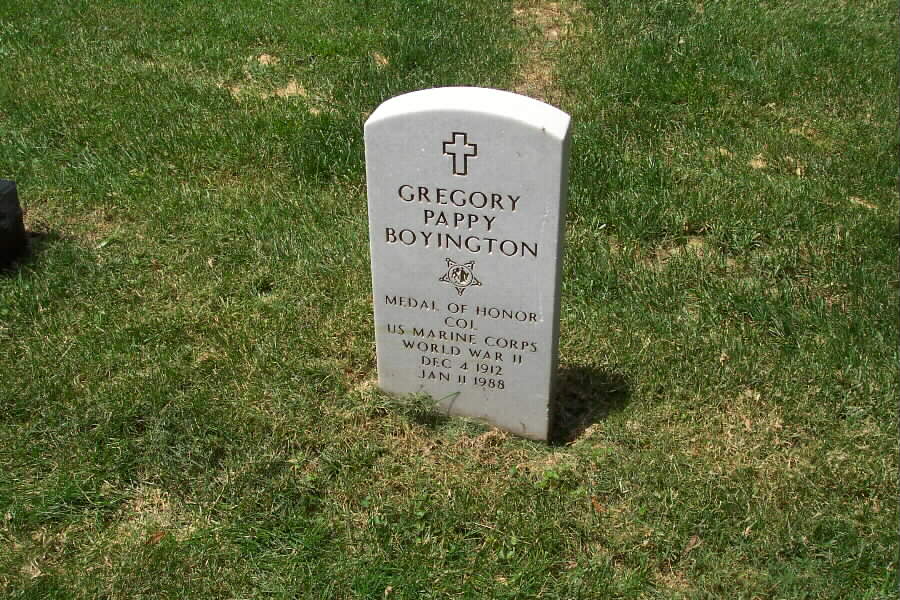Born in Idaho on December 4, 1912, he was a leading Marine Corps Air Ace in World War II. He had been a Marine Corps officer before the war, but had resigned his commission in order to serve with Claire Chennault's “Flying Tigers” in China.
When the United States entered the war, he rejoined the Marine Corps in early 1942 and was assigned to the Solomon Islands in the Pacific, and also served in the Bougainville campaign. He was shot down and subsequently captured by the Japanese on January 3, 1944 while on a mission over Rabaul. He was then a prisoner-of-war until he was liberated at the end of the war. He was awarded the Medal of Honor upon his return to the United States. He was promoted to Colonel upon his retirement from the Corps in 1947.
He died in Fresno, California, on January 11, 1988 and was buried in Section 7-A of Arlington National Cemetery, near the Memorial Amphitheater and the Tomb of the Unknowns.
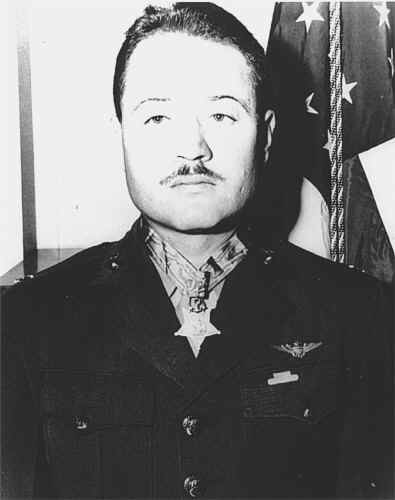
BOYINGTON, GREGORY
Rank and organization: Major, U.S. Marine Corps Reserve, Marine Squadron 214. Place and date: Central Solomons area, from 12 September 1943 to 3 January 1944. Entered service at: Washington. Born: 4 December 1912, Coeur D'Alene, Idaho. Other Navy award: Navy Cross.
Citation:
For extraordinary heroism and valiant devotion to duty as commanding officer of Marine Fighting Squadron 214 in action against enemy Japanese forces in the Central Solomons area from 12 September 1943 to 3 January 1944. Consistently outnumbered throughout successive hazardous flights over heavily defended hostile territory, Maj. Boyington struck at the enemy with daring and courageous persistence, leading his squadron into combat with devastating results to Japanese shipping, shore installations, and aerial forces. Resolute in his efforts to inflict crippling damage on the enemy, Major Boyington led a formation of 24 fighters over Kahili on 17 October and, persistently circling the airdrome where 60 hostile aircraft were grounded, boldly challenged the Japanese to send up planes. Under his brilliant command, our fighters shot down 20 enemy craft in the ensuing action without the loss of a single ship. A superb airman and determined fighter against overwhelming odds, Major Boyington personally destroyed 26 of the many Japanese planes shot down by his squadron and, by his forceful leadership, developed the combat readiness in his command which was a distinctive factor in the Allied aerial achievements in this vitally strategic area.
COEUR D'ALENE, Idaho – January 2008 – Gregory “Pappy” Boyington's last battle was tough, but he prevailed because fellow Marines had his back.
A two-year fight to rename the airport in Boyington's hometown in honor of the troubled World War II ace ended in success last fall, but only after overcoming reservations about the Medal of Honor winner who has been dead for 20 years.
Now Kevin Gonzalez, one of the leaders of the effort, has produced a documentary about the conflict that ended with Pappy Boyington Field being added to the Coeur d'Alene Airport name.
He interviewed everyone from Boyington's son to Robert Conrad, the actor who portrayed the pilot in the 1970s television series “Baa Baa Black Sheep.” He particularly showcased the military veterans who stood firm when some local leaders opposed the change.
“I thought it was important to document the efforts in the community to honor Pappy Boyington, because I couldn't understand why there was a controversy,” said Gonzalez, who served in the Marines from 1984-1988.
“I was inspired by the many veterans involved with the campaign because their resolve grew stronger,” he said. “This was truly a grass-roots effort.”
The 90-minute documentary, which Gonzalez will enter in film festivals, had its premiere a week ago on the 20th anniversary of Boyington's death.
Boyington, a Coeur d'Alene native, became a celebrity during World War II when he tied the Marine record for enemy planes shot down. After the war, he had problems with booze, women and money, but remained in the public eye because of his best-selling memoirs and the television series.
Boosters initially assumed there would be little opposition to renaming the airport, but the effort stalled in 2006 when the Kootenai County Commission refused to vote on the proposal. While no formal reason was given, there were vague concerns that the name change could confuse pilots and lead to crashes.
Some veterans, including members of the local Marine Corps League Pappy Boyington Detachment 966, smelled a rat.
“Some people think Pappy Boyington was a drinker and had other issues,” said veteran Robert Hunt in the documentary. “Lots came back from war with similar issues.”
“One of the major stumbling blocks was people bringing up the fact he was a womanizer and drinker,” said veteran Robert Rohrscheib.
But Boyington was an authentic hero, and likely suffered from what would later be called post-traumatic stress disorder, Rohrscheib said.
When two new commissioners were elected, the veterans tried again and the change was made last August.
County Commissioner Todd Tondee says in the documentary that Boyington was “a hero's hero” who deserved honor in his hometown.
“This man was an ace five times over,” Commissioner Rick Piazza added.
The ceremony to unveil the new name drew plenty of veterans, including Boyington's son, retired Air Force officer Greg Boyington Jr.
“Pappy belonged to the nation,” he said.
Actor Robert Conrad became friends with Boyington when he portrayed the hero on the television show in the late 1970s. In the documentary, Conrad joked that they both liked a bit of carousing.
He praised the effort to rename the airport.
“It's an honorable thing to do,” Conrad said.
Boyington was born Dec. 4, 1912, in Coeur d'Alene, and grew up in St. Maries, Idaho, and Tacoma, Wash. As a child, his first airplane flight was as a passenger of legendary Northwest aviator Clyde Pangborn during a barnstorming tour. Pangborn and a co-pilot later became the first men to fly nonstop across the Pacific Ocean.
Boyington graduated from the University of Washington in 1934 with an engineering degree and was a member of the wrestling team.
He spent a year as a Boeing draftsman before he joined the Marines. He was a flight instructor for six years until he volunteered to be a “Flying Tiger” pilot in China prior to Pearl Harbor.
Boyington became a Marine pilot after war was declared. In 1943, at the Espiritu Santo airfield in the New Hebrides, Boyington had a desk job handling the replacement pilots pool.
When a call for a fresh fighter squadron from the United States could not be filled, Boyington persuaded his superiors to let him form a unit from replacement flyers. The VMF 214 was born, and became the Black Sheep Squadron.
At first derided, the squadron in 12 weeks of combat destroyed 94 enemy fighters and made headlines back home.
Boyington was a flamboyant commander, a darling of war reporters, and was called Pappy because he was a decade older than most of his pilots.
As he neared the Marine record of 26 air kills, reporters descended on the squadron.
But the day of Boyington's 26th kill was also the day he was shot down. Rescued by a Japanese submarine, Boyington spent the next 20 months in prisoner of war camps.
The Marines listed him as missing in action, and many thought he died in the crash. He was awarded a Medal of Honor by President Roosevelt.
Boyington was found alive when his camp was liberated on August 28, 1945. He was honored at parades in San Francisco and Okanogan, Wash., where his family settled for a time.
He moved to California and became an executive at a brewery and later at an aerospace parts manufacturer.
He wrote a best-selling book about his wartime experiences in 1958 called “Baa Baa, Black Sheep.” The television series, with Boyington as technical adviser, debuted in 1976 and lasted two seasons.
Boyington battled alcohol addiction. He had a series of broken marriages and bounced among jobs. He died on Jan. 11, 1988, in Fresno, Calif., at 75 and was buried in Arlington National Cemetery.
BOYINGTON, GREGORY PAPPY
- Colonel, United States Marine Corps
- DATE OF BIRTH: 12/04/1912
- DATE OF DEATH: 01/11/1988
- BURIED AT: SECTION 7-A SITE 150
- ARLINGTON NATIONAL CEMETERY
Michael Robert Patterson was born in Arlington and is the son of a former officer of the US Army. So it was no wonder that sooner or later his interests drew him to American history and especially to American military history. Many of his articles can be found on renowned portals like the New York Times, Washingtonpost or Wikipedia.
Reviewed by: Michael Howard

